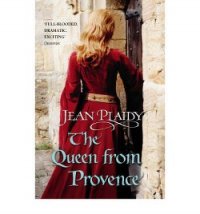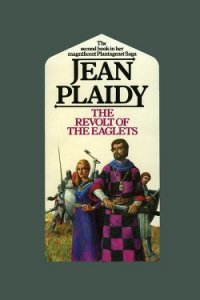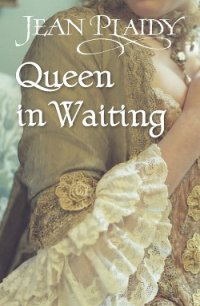The Red Rose of Anjou - Plaidy Jean (книги онлайн полные версии бесплатно .TXT) 📗
There was great consternation throughout the House and the lords were uncertain how to act. They accepted the pedigree, on the other hand Henry was their crowned King. At length one of them suggested that as the matter was so complicated it should be put before judges. It was a matter of law and for them to decide.
When York returned to Southwark it was to find Warwick there with Edward.
They immediately retired to an apartment where the three of them might talk in earnest.
It was clear that Warwick did not approve of York’s action in going to the Parliament. ‘The time is not ripe,’ said Warwick; and he was regretting that York stood before his son. How much easier it would be to handle Edward!
‘We have delayed long enough,’ said York. ‘It is time we let the people see what we stand for. We want Henry deposed and we have to let Margaret know that she has not a chance.’
‘It’s true,’ said Warwick, ‘but we should tread with more care. There is hostile feeling all around us, and it will need little to turn that into active support for Henry.’
‘Henry is hopeless and all know it.’
‘He still retains their affection. Well, we have gone so far, we must see what the judges make of it.’
The judges very quickly let them know. ‘This matter is too difficult for us to decide,’ was their verdict. ‘It is above our knowledge of the law and learning.’
It was fortunate that Warwick’s brother, George Neville, had been made Chancellor. He declared that it was clear that the King’s health prevented him from ruling. Let the decision remain to let him wear the crown until he died and then let it go to York.
There were some who thought this would shorten Henry’s life because there would most certainly be those who would want to be rid of him.
George Neville then said that if Henry died mysteriously they would not rest until they had found his murderer and no matter how high in the land that person was he should suffer the traitor’s death. Moreover, the Duke of York was considerably older than Henry. It seemed very likely that Henry would live longer.
So it was stated that York was officially to be declared heir to the throne.
When Henry was approached he buried his head in his hands. ‘I only ask to be left in peace,’ he said.
‘The Duke of York and his heirs will have the throne after you.’
‘Yes, yes,’ said the King wearily.
They were amazed. Had he forgotten the boy of whom he and Margaret had been so proud?
‘I want peace,’ cried Henry. ‘My country wants peace. Forsooth and forsooth, let us have peace and pay the price for it if we must.’
So York was declared heir to the throne. But there was no rejoicing in the streets.
Warwick shook his head apprehensively. ‘It was wrong. The people don’t like it. One always needs the people with one particularly in a situation like this which could be unpopular. No, you should not have done this. You should have waited until by very force of arms we could have deposed Henry and set you up.’
‘I agree with that,’ said Edward.
York looked sadly at his eldest son. Edward seemed to be all Warwick’s now. Rutland was his dear faithful son. Rutland would never question any moves he made.
Even as they talked together messengers were arriving. Margaret was gathering forces. She had the Tudors building up an army in Wales. Exeter was doing the same in the North as she herself was in Scotland.
‘No time for complacency,’ said Warwick. ‘Edward and I will remain in London to keep watch over the King and build up an army. You should go to York and muster as many men as you can. We may have to fight. It is hardly likely that Margaret will quietly accept this.’
The Duke of York agreed and left London for Yorkshire where he would amass an army to fight with him and retain his new title.
###
Christmas would soon come. Through the cold winds of winter York marched with his men. He would do little until the spring; it was never wise to make battle in the depths of winter.
He did not believe Henry would live long. There might be some who would make it their duty to see that he did not. And then...the crown would be his. Edward would be a worthy heir for all that he had become Warwick’s man rather than his father’s. Never mind. They were all on the same side and Edward was a son to be proud of.
They had come to the town of Worksop and as they were marching out of the town they were unaware of the ambush and Somerset’s troops were upon them before they could make ready to return the attack.
The fighting was fierce and the losses on both sides great.
They must get to York, thought the Duke. They must get to the castle of Sandal at least. That was within a mile or so of Wakefield.
He rallied his forces and cried out to them that they must leave the field and make with all speed for Sandal.
He was relieved when the grey stone castle rose up before him, a mighty fortress on the left bank of the River Calder.
He glanced at his son Rutland who was riding beside him. His favourite of late, one who had adhered to his father and resisted the wiles of the hero Warwick. Foolish to feel that envy but under Warwick’s influence Edward had changed towards him. They had been critical of him in London; they had made him feel that he was no longer the leader. Warwick was like that. Whenever he was present, one felt that though he might not be in command in the flesh he was in spirit.
‘We will show them, my son,’ he said to Rutland.
‘We will. Father,’ replied the boy.
They had not realized the size of the army which was approaching. Exeter with Clifford had done well in raising such an army for Margaret.
Salisbury who had accompanied them said that they were safe in the castle. He had sent messengers to Warwick and Edward to let them know how things stood. They need not worry. They could hold out until Warwick or Edward came to relieve them.
The Duke was frustrated. To be besieged in a castle waiting for Warwick and his son, it was too much to be borne. They criticized him enough already.
It was all very well to wait. He could imagine the day Warwick arrived, scattering the enemy, proudly riding into the city; and there would be Edward beside him, admiring, hanging on his words, pitying his father because he had had the ill luck—mismanagement they might say—to get himself besieged in Sandal Castle.
‘I shall not wait for relief,’ said York. T shall go out among them. I shall reduce their ranks. I will cripple this army so that it cannot come against me again.’
‘Is this wise?’ asked Salisbury. ‘We are outnumbered.’
‘We are not outclassed,’ said the Duke. ‘I can fight battles without Warwick and my eldest son.’
‘ ‘Tis so,’ agreed Salisbury. ‘But their help would be useful.’
‘Where are the enemy now?’
‘Encamped at Wakefield.’
‘A mile or so away. Then we will prepare to attack.’
###
Thus was fought the battle of Wakefield. It was folly from the start to have attempted it. The Yorkists were completely outnumbered. Many were slain on that field including the Duke of York and his son Rutland.
It was with great exultation that the Lancastrians discovered the dead body of the Duke. They cut off his head and sent it to York to be stuck on the walls of the city and someone had placed a paper crown on his head.
Salisbury was captured but they would not allow him to live. He was too dangerous. His head was displayed on the walls of York beside that of his friend and ally.
It was defeat. York was dead. When Margaret heard the news she was almost wild with joy.
‘The tide has turned,’ she cried. ‘This is our greatest victory. We are going to win back what is ours and the fate of every traitor in England shall be as that of the Duke of York.’
MARGARET’S TRIUMPH




